D Die Wahl des Studiums ist wohl für alle erstmal ein riesiger Schritt: eine enorm große Auswahl und man weiß oft noch nicht so wirklich was man will. Für mich gab es ganz klar zwei Dinge, die ich als meine Stärken sehe: Fotografie und Informatik - was ich allerdings nur vom in meinen Augen wenig aussagekräftigen Schulfach her beurteilen konnte.
Ich habe eine ganze Zeit lang überlegt, ob ich Fotografie studieren soll und mich schließlich dagegen entschieden. Fotografie ist mein Hobby, mein sicherer Hafen, meine Entspannung, das wollte ich nicht zum Beruf machen.
Heute habe ich einen Gastblogger für euch, der sich für ein Fotografiestudium in Rotterdam entschieden hat. Ich fand es super interessant von ihm zu erfahren wie genau so ein Studium aussieht und was er davon hält. Also lassen wir ihn erzählen, darf ich vorstellen: Ricardo vom Blog Hey Ricardo.
"Fotografie kann man studieren?
Ich glaube, wenn ich beantworten müsste, welchen Satz ich schon zum 10.000 Mal gehört habe wird es wahrscheinlich auf diese Frage herauslaufen: „Ach was! Fotografie kann man studieren?“ Nachdem ich dann meistens nur mit „Ja.“ antworte und mich innerlich schon darauf einstelle zu erklären was denn das Studium von einer normalen Ausbildung zum Fotografen unterscheidet. Und ich kann euch sagen, ich glaube nicht sehr viel.
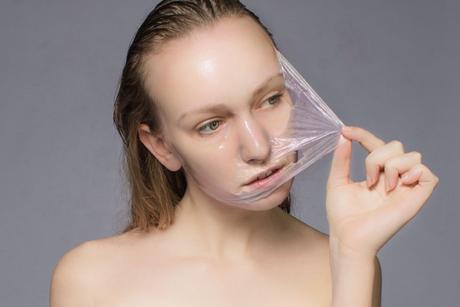
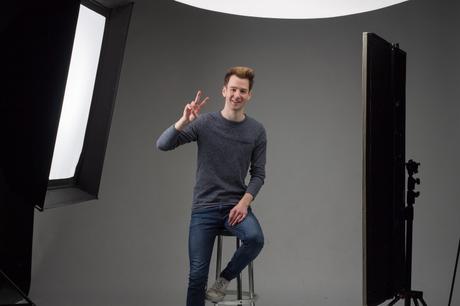
E To choose the right study path is pretty hard and a big step in our lives: there is a huge variety and most of the time you don't really know what you want. For me there were only two things where I see my strength: photography and computer science - what was pretty hard for me to judge because I just had it as a subject in school.
For a long time I was thinking about studying photography and in the end I decided against it. Photography is my hobby, my save haven, my relaxation. So I didn't wanted it as a job.
Today I have a guestblogger for you, that choose to study photography in Rotterdam. I found it really interesting to hear how this study path looks like and what he is thinking about it. So now he will tell you all the interesting stuff about photography as a study path, let me introduce you: Ricardo from the blog Hey Ricardo.
"Wait, you can study photography?!
I think, if I have to decide which question freaks me out the most, it would totally be “What?! You can actually study photography?”. After mostly just replying with a simple “Yeah.”, I already prepare myself to explain what makes this study so amazing and different from the normal education. The thing is… Not that much!
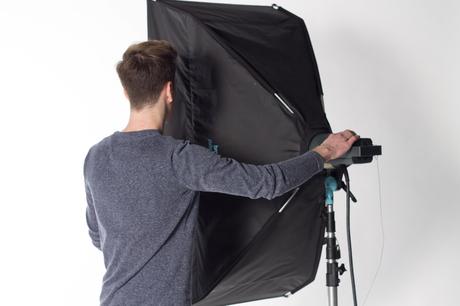
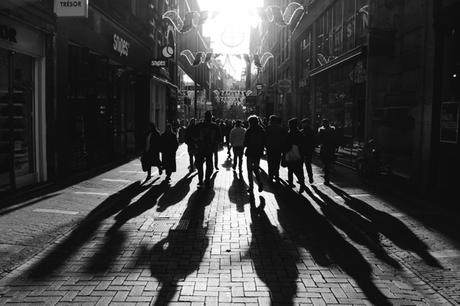
D Eine Ausbildung kam für mich nie in Frage
Eigentlich habe ich keine Ahnung warum eine Ausbildung für mich nie in Frage kam, ich glaube es war einzig und allein der Aspekt, dass ich nicht irgendwo für 3 Jahre Passfotos knipsen wollte. Zumindest habe ich mir so eine Ausbildung zum Fotografen vorgestellt...
Außerdem wollte ich immer schon ins Ausland. Dort arbeiten, leben, lernen – einfach mal raus und etwas Neues sehen. Ich denke, dass liegt daran, dass kreative Menschen immer neue Inspiration brauchen und da ist das Leben in einer Kleinstadt jetzt nicht gerade hilfreich und Reisen war schon immer meine Leidenschaft. Was gibt es schöneres als durch eine neue für dich unbekannte Stadt zu laufen und sich einfach komplett unbekannt zu fühlen – Entdecken ist doch super aufregend!
Ich kann es immer noch nicht wirklich glauben und wenn ich anderen erzähle, dass ich schon knapp ein halbes Jahr von zu Hause weg bin um in einer großen Stadt, in einem anderen Land zu studieren, ziehen meine Mundwinkel über beide Ohren... nein davon gibt es kein Foto ;)
E Why did I chose to study?
Actually I don’t really have an idea why a study was so important to me. I think it was just the fact that I didn’t wanted to end up taking passport photos for three whole years in a row. At least that’s what I thought how the normal education would look like.
Moreover, I always, always, always wanted to study abroad. Work, learn and live there – just experience something new. I think it's because creative people need some new input every now and then, and let's be honest, living in a small city is kinda' counterproductive.
And hence travelling was always my passion, I moved to the Netherlands. What is better than walking through an for you unknown city and just discover. More than half a year...
I actually haven’t realized it yet and every time I tell someone that I’m already studying half a year abroad my face glows from smiling – and no, I don’t have a photo oft hat, but I’m pretty sure you can picture an overly excited me in your head.
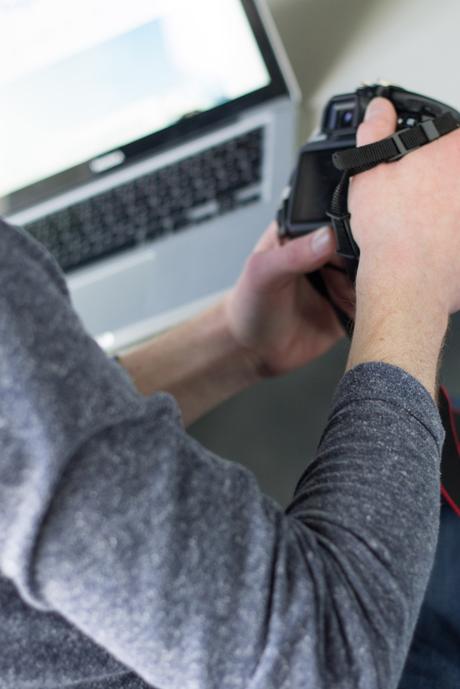
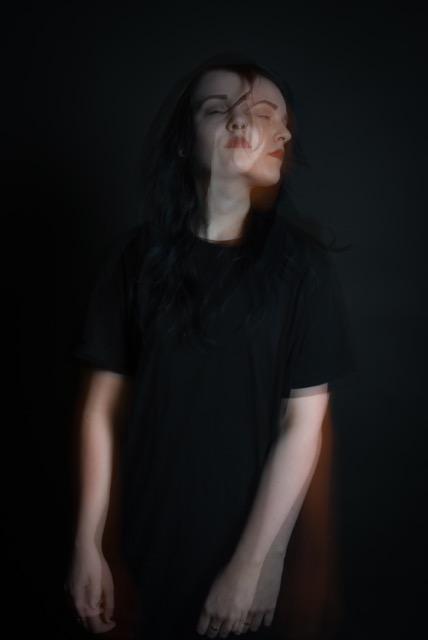
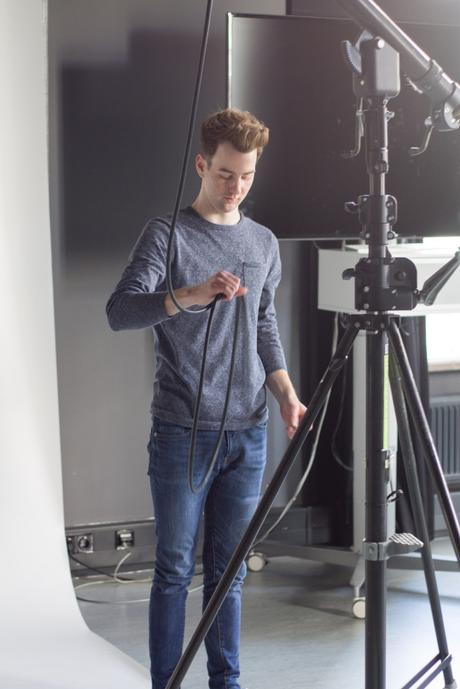
D Wie ist denn jetzt so ein Studium?
Erstmal muss man sagen, dass ich nicht an einer Universität studiere sondern an einer Kunstakademie – falls ihr jetzt den genauen Unterschied wissen wollt: ich habe absolut keine Ahnung, wir sind aber eher praktisch Beschäftigt und der wissenschaftliche Aspekt ist nur eine Nebenrolle.
Meine Schule benutzt das System von Projektunterricht, das heißt ich habe eigentlich keine klassischen Fächer sondern das Projekt: Fotografie, in dem im jedem, 10 Wochen dauerndem, Quartal, ein besonderes Thema behandelt wird.
Außerdem haben wir zwei Morgen oder Abende Zeit um das riesige Angebot unsere Schule zu nutzen. Wir müssen bestimmte Studienpunkte sammeln und dabei helfen uns „Offene Angebote“. Wenn du zum Beispiel Lust hast etwas über Typografie zu lernen, aber gar kein Grafikdesign studierst, kannst du dich so weiterbilden. Ein echt unglaublicher Vorteil zu anderen Schulen! Ich bin kein Freund von Werbung, aber bei uns kann man sein wer man sein möchte!
Es geht darum zu verstehen, dass ein schönes Foto nicht gleich ein gutes ist. Dass soll nicht heißen, dass dein Hochzeitsfoto oder das Foto von dem Sonnenuntergang aus dem letzten Urlaub, schlecht ist – im Gegenteil, ich fotografiere selbst auch Hochzeiten! Allerdings steht bei uns im Vordergrund mit einem Foto eine Geschichte zu erzählen, jemanden die Augen zu öffnen oder die Fotografie als Medium zu nutzen, um unsere eigenen Meinungen und Gefühle zu übermitteln. – Es ist also seeeeehr künstlerisch!
Außerdem wird bei uns sehr auf „Research“ geachtet, also die kreative Denkzeit bevor die Idee zu einem Foto entsteht. Dazu benutzen bei uns viele ein „Tagebuch“ wo einfach alles was uns einfällt, alle Ideen alle Gedanken, Bilder ... ach einfach Alles reingekritzelt und geklebt wird. Manchmal weiß man selber nicht was es soll aber es hilft ungemein. So ist es hinterher super einfach Denkprozesse nachzuvollziehen und die Ideen aus dem Kopf in ein Foto zubringen.
Einmal in der Woche steht dann noch Allgemeine Kunsttheorie an, das wohl von allen am meisten gehasste Fach. Dort lernen wir in klassischen Vorlesungen über die Geschichte der Kunst, von A bis Z und manchmal kreuz und quer. Jedes Quartal wird dann alles zusammengefasst und als Hausarbeit eingereicht.
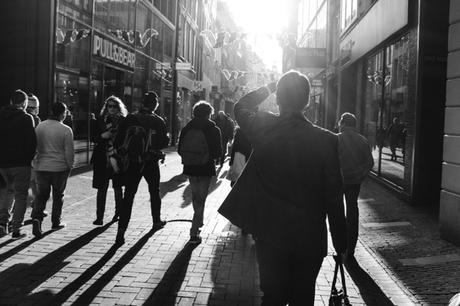
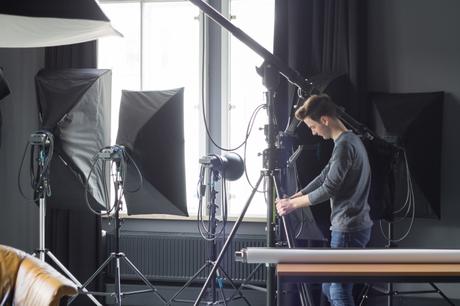
E How’s your study?
First of all, I have to say that I do not study at a classic university but at an art academy, sounds fancy right? Well, I actually don’t know the very exact specifications that differs from a university but I know that we are really, really concentrated on practical experience and, of course, learning by failing! The scientific part of the study is not that extreme but still important.
My school makes use of project based education which basically means that you don’t really have any strict courses, amaaaazing! For 4 times 10weeks a year we are working on a specific topic within our studies. Later, in the 2nd year we will have to choose a so called practice which will provide us with lectures and projects in, for example, critical, social or commercial studies. Moreover, in the 3rd year, we also get the chance for a 20 week long internship or an international exchange study.
Furthermore, to use the huge open courses our school, we get two mornings or evenings a week off to do so. Through those open courses we can gain points which will not only guarantee a good grade but are also necessary for continuing the study in the next year. So if you want to learn something about typography, even if you don’t study graphic design, you can do so within an open course – which is pretty great!
In our study we learn that a beautiful photo is not always a good one. And I don’t mean that your wedding photos or the photo of the nice sunset of your last vacation is bad – I actually shoot weddings myself! However, what it’s really about in our study is that the photo needs to tell a story, open the viewer’s eyes or even shock them. The whole education is reeaaallly arty, and that’s what I like about it.
Moreover, our teachers also pay great attention to the research, so the creative process you go through before taking a photograph. To make sure we can visualize everything later and don’t forget anything we all use some sort of a diary where we basically put everything in that inspires us and that helped us in creating an idea for a photo project.
Once a week we also have general art history, which is basically the most hated thing I guess. In classic lectures we learn about art history from A to Z and sometimes zick-zack. Every quarter we then have to sum everything up in a research paper and hand it in.
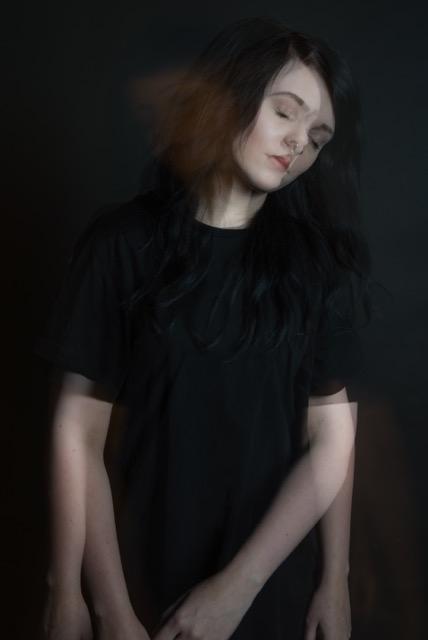
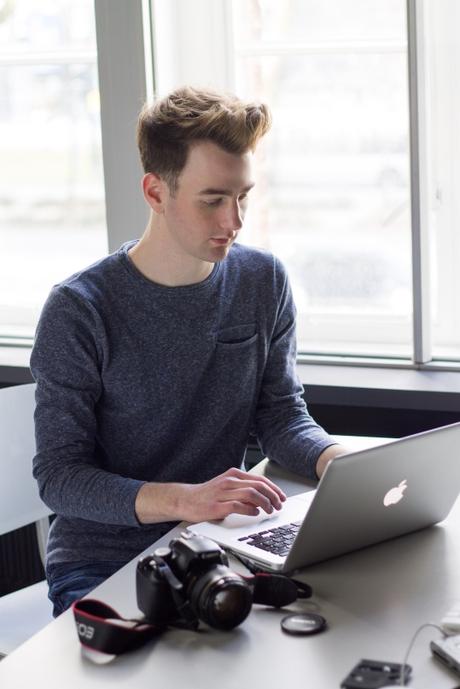
D Zurück?
Niemals! Ich würde aber sagen: „Weiter!“. Ich glaube nach einem halben Jahr kann ich sagen, dass ich angekommen bin, allerdings würde es mich auch nicht wundern, wenn ich nach dem Studium weiter ziehe, denn es gibt doch noch viele Städte und Orte dieser Welt die man gesehen haben muss, oder? "
E Back to Germany?
If you ask me, I’d really say that I don’t want to go back… actually I want to go further. After half a year I can say that I really got used to living here but I also am excited to see and live in all those other exciting cities. "




Ich habe eine ganze Zeit lang überlegt, ob ich Fotografie studieren soll und mich schließlich dagegen entschieden. Fotografie ist mein Hobby, mein sicherer Hafen, meine Entspannung, das wollte ich nicht zum Beruf machen.
Heute habe ich einen Gastblogger für euch, der sich für ein Fotografiestudium in Rotterdam entschieden hat. Ich fand es super interessant von ihm zu erfahren wie genau so ein Studium aussieht und was er davon hält. Also lassen wir ihn erzählen, darf ich vorstellen: Ricardo vom Blog Hey Ricardo.
"Fotografie kann man studieren?
Ich glaube, wenn ich beantworten müsste, welchen Satz ich schon zum 10.000 Mal gehört habe wird es wahrscheinlich auf diese Frage herauslaufen: „Ach was! Fotografie kann man studieren?“ Nachdem ich dann meistens nur mit „Ja.“ antworte und mich innerlich schon darauf einstelle zu erklären was denn das Studium von einer normalen Ausbildung zum Fotografen unterscheidet. Und ich kann euch sagen, ich glaube nicht sehr viel.


E To choose the right study path is pretty hard and a big step in our lives: there is a huge variety and most of the time you don't really know what you want. For me there were only two things where I see my strength: photography and computer science - what was pretty hard for me to judge because I just had it as a subject in school.
For a long time I was thinking about studying photography and in the end I decided against it. Photography is my hobby, my save haven, my relaxation. So I didn't wanted it as a job.
Today I have a guestblogger for you, that choose to study photography in Rotterdam. I found it really interesting to hear how this study path looks like and what he is thinking about it. So now he will tell you all the interesting stuff about photography as a study path, let me introduce you: Ricardo from the blog Hey Ricardo.
"Wait, you can study photography?!
I think, if I have to decide which question freaks me out the most, it would totally be “What?! You can actually study photography?”. After mostly just replying with a simple “Yeah.”, I already prepare myself to explain what makes this study so amazing and different from the normal education. The thing is… Not that much!


D Eine Ausbildung kam für mich nie in Frage
Eigentlich habe ich keine Ahnung warum eine Ausbildung für mich nie in Frage kam, ich glaube es war einzig und allein der Aspekt, dass ich nicht irgendwo für 3 Jahre Passfotos knipsen wollte. Zumindest habe ich mir so eine Ausbildung zum Fotografen vorgestellt...
Außerdem wollte ich immer schon ins Ausland. Dort arbeiten, leben, lernen – einfach mal raus und etwas Neues sehen. Ich denke, dass liegt daran, dass kreative Menschen immer neue Inspiration brauchen und da ist das Leben in einer Kleinstadt jetzt nicht gerade hilfreich und Reisen war schon immer meine Leidenschaft. Was gibt es schöneres als durch eine neue für dich unbekannte Stadt zu laufen und sich einfach komplett unbekannt zu fühlen – Entdecken ist doch super aufregend!
Ich kann es immer noch nicht wirklich glauben und wenn ich anderen erzähle, dass ich schon knapp ein halbes Jahr von zu Hause weg bin um in einer großen Stadt, in einem anderen Land zu studieren, ziehen meine Mundwinkel über beide Ohren... nein davon gibt es kein Foto ;)
E Why did I chose to study?
Actually I don’t really have an idea why a study was so important to me. I think it was just the fact that I didn’t wanted to end up taking passport photos for three whole years in a row. At least that’s what I thought how the normal education would look like.
Moreover, I always, always, always wanted to study abroad. Work, learn and live there – just experience something new. I think it's because creative people need some new input every now and then, and let's be honest, living in a small city is kinda' counterproductive.
And hence travelling was always my passion, I moved to the Netherlands. What is better than walking through an for you unknown city and just discover. More than half a year...
I actually haven’t realized it yet and every time I tell someone that I’m already studying half a year abroad my face glows from smiling – and no, I don’t have a photo oft hat, but I’m pretty sure you can picture an overly excited me in your head.



D Wie ist denn jetzt so ein Studium?
Erstmal muss man sagen, dass ich nicht an einer Universität studiere sondern an einer Kunstakademie – falls ihr jetzt den genauen Unterschied wissen wollt: ich habe absolut keine Ahnung, wir sind aber eher praktisch Beschäftigt und der wissenschaftliche Aspekt ist nur eine Nebenrolle.
Meine Schule benutzt das System von Projektunterricht, das heißt ich habe eigentlich keine klassischen Fächer sondern das Projekt: Fotografie, in dem im jedem, 10 Wochen dauerndem, Quartal, ein besonderes Thema behandelt wird.
Außerdem haben wir zwei Morgen oder Abende Zeit um das riesige Angebot unsere Schule zu nutzen. Wir müssen bestimmte Studienpunkte sammeln und dabei helfen uns „Offene Angebote“. Wenn du zum Beispiel Lust hast etwas über Typografie zu lernen, aber gar kein Grafikdesign studierst, kannst du dich so weiterbilden. Ein echt unglaublicher Vorteil zu anderen Schulen! Ich bin kein Freund von Werbung, aber bei uns kann man sein wer man sein möchte!
Es geht darum zu verstehen, dass ein schönes Foto nicht gleich ein gutes ist. Dass soll nicht heißen, dass dein Hochzeitsfoto oder das Foto von dem Sonnenuntergang aus dem letzten Urlaub, schlecht ist – im Gegenteil, ich fotografiere selbst auch Hochzeiten! Allerdings steht bei uns im Vordergrund mit einem Foto eine Geschichte zu erzählen, jemanden die Augen zu öffnen oder die Fotografie als Medium zu nutzen, um unsere eigenen Meinungen und Gefühle zu übermitteln. – Es ist also seeeeehr künstlerisch!
Außerdem wird bei uns sehr auf „Research“ geachtet, also die kreative Denkzeit bevor die Idee zu einem Foto entsteht. Dazu benutzen bei uns viele ein „Tagebuch“ wo einfach alles was uns einfällt, alle Ideen alle Gedanken, Bilder ... ach einfach Alles reingekritzelt und geklebt wird. Manchmal weiß man selber nicht was es soll aber es hilft ungemein. So ist es hinterher super einfach Denkprozesse nachzuvollziehen und die Ideen aus dem Kopf in ein Foto zubringen.
Einmal in der Woche steht dann noch Allgemeine Kunsttheorie an, das wohl von allen am meisten gehasste Fach. Dort lernen wir in klassischen Vorlesungen über die Geschichte der Kunst, von A bis Z und manchmal kreuz und quer. Jedes Quartal wird dann alles zusammengefasst und als Hausarbeit eingereicht.


E How’s your study?
First of all, I have to say that I do not study at a classic university but at an art academy, sounds fancy right? Well, I actually don’t know the very exact specifications that differs from a university but I know that we are really, really concentrated on practical experience and, of course, learning by failing! The scientific part of the study is not that extreme but still important.
My school makes use of project based education which basically means that you don’t really have any strict courses, amaaaazing! For 4 times 10weeks a year we are working on a specific topic within our studies. Later, in the 2nd year we will have to choose a so called practice which will provide us with lectures and projects in, for example, critical, social or commercial studies. Moreover, in the 3rd year, we also get the chance for a 20 week long internship or an international exchange study.
Furthermore, to use the huge open courses our school, we get two mornings or evenings a week off to do so. Through those open courses we can gain points which will not only guarantee a good grade but are also necessary for continuing the study in the next year. So if you want to learn something about typography, even if you don’t study graphic design, you can do so within an open course – which is pretty great!
In our study we learn that a beautiful photo is not always a good one. And I don’t mean that your wedding photos or the photo of the nice sunset of your last vacation is bad – I actually shoot weddings myself! However, what it’s really about in our study is that the photo needs to tell a story, open the viewer’s eyes or even shock them. The whole education is reeaaallly arty, and that’s what I like about it.
Moreover, our teachers also pay great attention to the research, so the creative process you go through before taking a photograph. To make sure we can visualize everything later and don’t forget anything we all use some sort of a diary where we basically put everything in that inspires us and that helped us in creating an idea for a photo project.
Once a week we also have general art history, which is basically the most hated thing I guess. In classic lectures we learn about art history from A to Z and sometimes zick-zack. Every quarter we then have to sum everything up in a research paper and hand it in.


D Zurück?
Niemals! Ich würde aber sagen: „Weiter!“. Ich glaube nach einem halben Jahr kann ich sagen, dass ich angekommen bin, allerdings würde es mich auch nicht wundern, wenn ich nach dem Studium weiter ziehe, denn es gibt doch noch viele Städte und Orte dieser Welt die man gesehen haben muss, oder? "
E Back to Germany?
If you ask me, I’d really say that I don’t want to go back… actually I want to go further. After half a year I can say that I really got used to living here but I also am excited to see and live in all those other exciting cities. "





